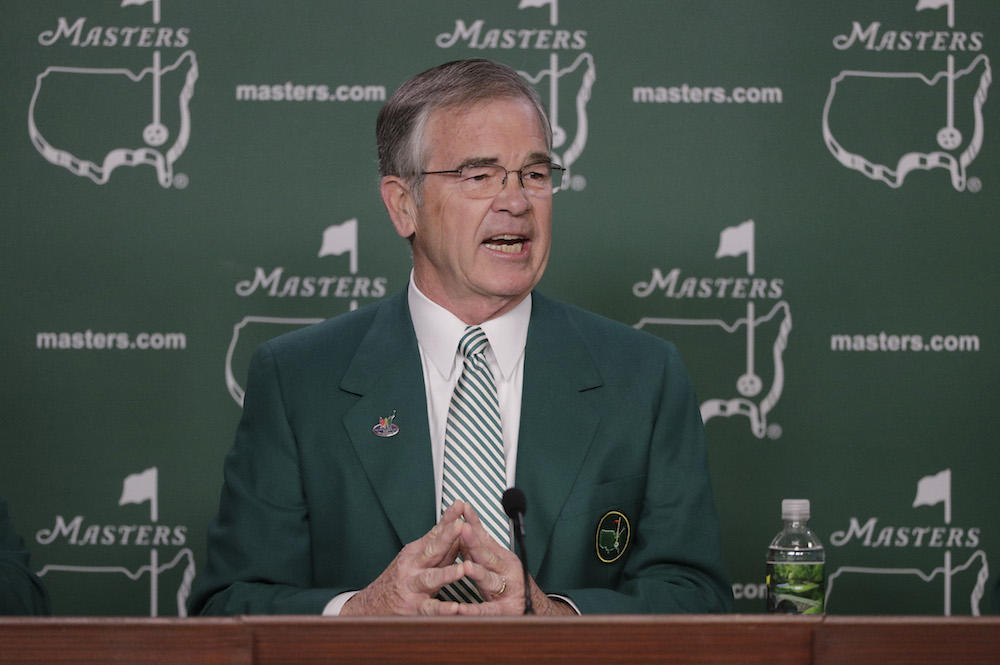Section Branding
Header Content
Billy Payne Retiring As Masters, Augusta National Chairman
Primary Content
Billy Payne is retiring as chairman of Augusta National and the Masters, ending 11 years of substantial change that included the club having its first female members and playing a leading role in growing the game around the world.
Payne officially retires on Oct. 16 when the club opens for a new season.
"There are two people that matter here — Clifford Roberts and Bobby Jones," Payne said of the Augusta National co-founders. "The rest of us are custodians. We do our best to first embrace, and thereafter hopefully to advance their philosophies for this club and for the game of golf — their obsession for detail, their passion to be the best. And I've done that now for a considerable number of years."
Payne will be succeeded by Fred Ridley, a former U.S. Amateur champion and USGA president who is chairman of the Masters competition committee. Ridley will be the seventh chairman, and the first to have played in the Masters.
Payne stays on as chairman emeritus.
He ends a remarkable career marked by two sporting events in which he had little previous experience. Payne, 69, had never been to the Olympics when he led a long-shot bid to bring the Summer Games to Atlanta in 1996, relying heavily on corporate support and showing early signs of his feelings for diversity and inclusion with whom he selected to serve on the Atlanta organizing committee. Two of the first five were women.
Payne, who did not take up golf until his adult years, was invited to join Augusta National in 1997, a year after he concluded his work with the Atlanta Games. He became media chairman of the Masters three years later, and he was Hootie Johnson's choice to succeed him as chairman in 2006.
He spent 11 years blending his ideas for progress with the traditions of a club that dates to 1931. As chairman, he ruled more with an open mind than an iron fist. He spoke openly about the support of his staff, and of the members.
Ten years after Johnson stubbornly stood his ground under pressure to have female members, former Secretary of State Condoleezza Rice and South Carolina financier Darla Moore joined Augusta National in 2012.
That was but a small part of Payne's influence over the club and that Masters.
Wanting to expand the reach of golf, he worked with the R&A to start the Asia-Pacific Amateur, awarding the winner a spot in the Masters. The idea was to create heroes in an emerging market. The second winner was Hideki Matsuyama of Japan, who now is No. 2 in the world. The USGA and R&A joined with Augusta National's next venture, the Latin America Amateur.
Payne also brought in the USGA and PGA of America to start the Drive, Chip and Putt competition, which attracts children all over the country to compete in golf skills, with the finals held at Augusta National on the Sunday before the Masters.
Payne considers those grow-the-game initiatives and enhancing the experience and camaraderie for club members the two achievements that bring him the most pride.
"It's pretty clear that both our founders were proponents and advocates and lovers of the game of golf," he said. "What has changed lately is that we have significantly more resources to fulfill objectives that they had from the very early years. So all these 'grow-the-game initiatives,' it's nothing new at Augusta National. It's just that one day we said, 'Let's make a bigger investment.'"
The investments included work at the home of the Masters.
The club has scooped up land around the perimeter and turned Augusta National into more of a campus than a golf course. That includes free parking for the spectators, and the opening of Berckmans Place, a state-of-the-art hospitality area just beyond the fifth fairway.
Payne loves to tell the story of how his father would always ask him, "Did you do your best?" Payne says he never felt he could answer affirmatively, which drove him to a relentless work ethic in bringing the Olympics to Atlanta and in his role as Augusta National chairman.
"Yes, there's a striving for perfection," Payne said. "Striving for perfection is truly an obsession here, in the context of the Masters. We want to be able to provide for our patrons, our fans around the world, the absolute best sporting experience they have ever encountered. And we go to extremes to try to do that."
Augusta National last year added a two-story press building, the latest and most grandiose of buildings it has created with the Southern architectural style that Payne feels fans around the world have come to expect when they think of Augusta National and the Masters.
"We never get it quite right," he said. "But man, we try hard."
Payne was the first chairman who had never met either Jones or Roberts.
Ridley first met Roberts when he played the Masters in 1976 as the U.S. Amateur champion. Like Payne, his background is in real estate law. Payne recalls that when he began his tenure as chairman, his predecessor told him the most important job he faced was finding his own successor.
"This honor ... is too great for one person to claim as their own for too long a period of time," Payne said. "I retire knowing it is simply the right thing to do — and at the right moment — to open the door and invite someone new to be called upon to lead."

